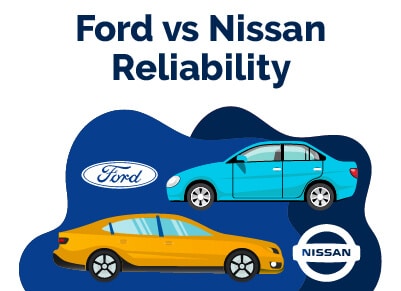Ford vs Nissan: Which Is More Reliable?
March 26, 2023


Chris is Head of Content for FindTheBestCarPrice and is based out of Philadelphia, PA. As a seasoned automotive industry analyst and car enthusiast, he ensures the highest level of quality across all our content and curates our picks for the best deals each month.
Chris studied information systems and marketing at Drexel University and writes about a wide range of topics ranging from car buying tips to troubleshooting common mechanical issues.
When he’s not thinking about cars, he likes to stay in with his dog and make an “attempt” to finish a crossword puzzle (he’s not quite at the Saturday/Sunday level…yet). As a former cheesemonger, Chris still has a “sharp” passion for all things cheese, and his fridge is always loaded with it!
Chris also has a passion for things that go fast, and drones are no exception. He spends some of his time writing for Dronesourced.
When comparing the reliability of Ford and Nissan vehicles, there are a few key factors to consider; the gas mileage, durability, engine and performance, safety and technology, and the design of both brands.
However, on an overall scale, Ford is more reliable than Nissan. Nissan has more reliability ratings than Ford, but considering their problematic transmissions, we will always recommend Ford cars.
Here's all you need to know about Ford’s vs. Nissan’s reliability and factors you should consider before choosing one.
Key Takeaways
- Ford and Nissan are both known for their reliability, but, due to making more high-quality vehicles, Ford is generally considered a bit more reliable than Nissan
- Nissans are generally more affordable to maintain and repair, while Ford offers more advanced technology and safety features as well as better engine performance
- Both Ford and Nissan offer fuel-efficient, affordable cars
Table of Contents
Ford vs. Nissan Reliability: A Detailed Comparison
| Features | Ford | Nissan |
| Gas Mileage | ||
| Design | ||
| Repair and Maintenance Cost | ||
| Engine and performance | ||
| Safety | ||
| Durability | ||
| Technology |
Ford vs. Nissan Reliability: Which Is Better?
The decision between Ford's and Nissan's reliability is a tricky one. This is because, although Nissan gets higher reliability ratings, they are not better than most Ford vehicles.
According to RepairPal, Nissan gets a reliability rating of 4.0/5.0, ranking 9th out of 32 car brands. Ford falls behind with a 3.5 rating, ranking 21st out of 32 car brands.
Ford beats Nissan with higher dependability scores, earning higher scores and above average than Nissan, which falls below the average standard for a dependable car brand.
It is easier to tell you that Ford is better than Nissan regarding reliability. However, you'll need to understand what made it so.
Ford beats Nissan with higher safety ratings and more powerful engines. The design philosophy varies on both brands, just as the different gas mileage achieved by their respective models. Your choice depends on your preference and needs.
You must understand that irrespective of the fact that Nissan has higher reliability ratings than Ford, there are some Ford models with higher ratings than Nissan vehicles. For instance, the Ford F-150 pickup truck has a higher reliability rating than Nissan's full-size Titan pickup.
You don't need to rely only on reliability ratings to get factual information about the reliability of car brands. We will compare the different models of Ford and Nissan cars alongside the features that they offer.
Ford vs. Nissan Reliability: Design
Ford and Nissan have a reputation for producing reliable vehicles, but their approach to design is greatly different. The lineup is similar for both brands: sports cars, SUVs, trucks, crossovers, electrics, and hybrids.
Nissan adopts a design philosophy that focuses more on how they make their vehicles than what they make. This design philosophy prioritizes innovation and technology, employing the best practices in achieving unique styles and expressions in each of their vehicles.
Nissan started by adopting the J-DNA, incorporating consideration, design, and action. Although Nissan vehicles are sporty and aggressive designs, very attractive and practical, their faulty transmissions pose a hindrance to their reliability.
Ford is both stylish and functional.
Although Ford vehicles are known for their sleek and modern designs that are both aesthetically pleasing and practical, the Ford design philosophy is quite simple — producing cars that are always in motion.
The exterior and interior design approach of both brands is different. While Ford and Nissan embrace ergonomics, intuitive layouts, and easy-to-use infotainment, Ford has more of a rugged interior and a boxy exterior with sharp lines and bold grilles.
Nissan gets more aerodynamic designs with a touch of comfort and luxury.
Winner: Both
Ford vs. Nissan Reliability: Engine and Performance
Unlike Nissan, Ford boasts of better engines and performance. The company offers a wide range of engines, including V6 and V8, designed to provide maximum power and efficiency. Ford vehicles also deliver better engine speed, power, and durability without sacrificing the need to offer smooth and comfortable rides.
Nissan also has good engines and performance, focusing on steering and control, but there isn't much emphasis on power like in Ford cars.
For instance, the Ford F150 returns up to 400 HP. This is compared to the Nissan Frontier, which peaks at 310 HP. With an average of 160 HP and optional power of 252 HP, the Ford Focus beats the Nissan Sentra.
The Ford Mustang coupe also returns better power than the Nissan Altima. Most Ford vehicles have better engine power and strength than Nissan. However, there are exceptions to the Nissan Altima, as it gets better hp than the Ford Fusion.
Regarding engine durability, Ford is doing a better job as consumers haven't shaken off the thoughts of the bad transmissions that Nissan offered over the years.
Winner: Ford
Ford vs. Nissan Reliability: Safety and Technology
Ford and Nissan's vehicles are equipped with a wide range of safety features that are designed to protect users in the event of a crash.
Both companies offer advanced features like lane departure warnings, forward-collision warnings, automatic emergency braking, amazing navigation systems, rearview cameras, and infotainment systems.
It is indisputable that Nissan and Ford are good at producing safe cars, but Ford's higher safety rating than Nissan makes it a more reliable option.
Nissan has only six cars earning the IIHS Top Safety while Ford has up to seven vehicles earning the IIHS Top Safety Pick (+) award.
Winner: Ford
Ford vs. Nissan Reliability: Gas Mileage
Ford and Nissan vehicles are known for their excellent gas mileage. Both companies offer a wide range of vehicles that are designed to provide maximum fuel efficiency. This includes hybrid and electric options.
The Ford brand utilizes advanced technology such as EcoBoost engines to provide maximum fuel efficiency. Nissan relies on CVT transmissions to achieve great fuel efficiency. The major difference between the gas mileage of Ford and Nissan boils down to your chosen model.
For instance: the Nissan Versa boasts of an impressive fuel economy of up to 31 MPG on the highway and 27 for the city.
On the other hand, the Ford Fusion returns 27 MPG and 23 MPG for city and highway, respectively.
The Nissan Altima is also a good fuel-efficient option. You'll get up to 39 MPG on the highway and 28 MPG in the city. The Nissan Leaf is an all-electric vehicle with a fuel economy of 111 combined.
Ford Fusion Hybrid boasts an impressive fuel economy of up to 43 MPG on the highway and 41 on the city, while the Ford C-Max Hybrid offers up to 42 MPG on the city and 38 highway. There's an endless list of Nissan and Ford fuel-efficient models to suit the needs of different buyers. It is up to you to decide what you want.
Winner: Both
Ford vs. Nissan Reliability: Repair and Maintenance Cost
According to RepairPal, repairing and maintaining a Nissan car is cheaper than a Ford. Ford gets an average annual repair cost of $775, compared to Nissan, which gets just $500.
With Ford, you have an average 15% probability of significant repairs. Nissan returns a better major repair frequency of 13% and a 0.3 chance of visiting the repair shop.
Although Nissan has a history of bad transmissions, the repair and maintenance cost is always cheaper than expected.
Winner: Nissan
Conclusion
In conclusion, both Ford and Nissan are reliable car manufacturers that offer a wide range of vehicles that vary in design, engine and performance, safety and technology, and gas mileage.
Ford vehicles are known for sleek and modern designs, powerful engines, and excellent performance, while Nissan vehicles are known for their sporty and aggressive designs.
The major difference between both brands is in Ford’s engine strength, safety ratings, and standards for durability. Both brands are not the most reliable cars or one of our most recommended ones, but there are quite a few good reasons to choose them.
Ultimately, choosing a Ford or Nissan vehicle will depend on personal preference and specific needs.
Best Car Deals by Category
Posted in Car Buying Tips |




